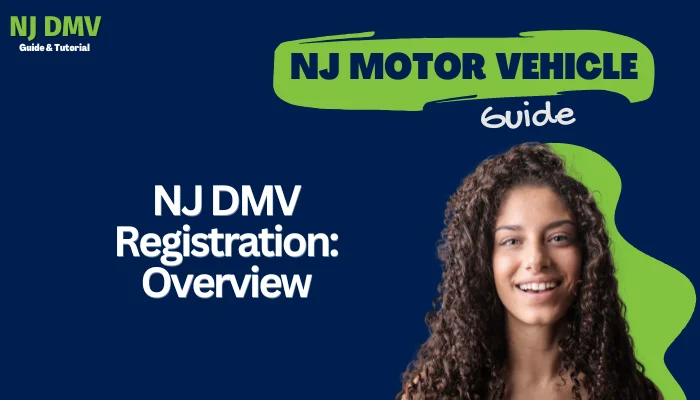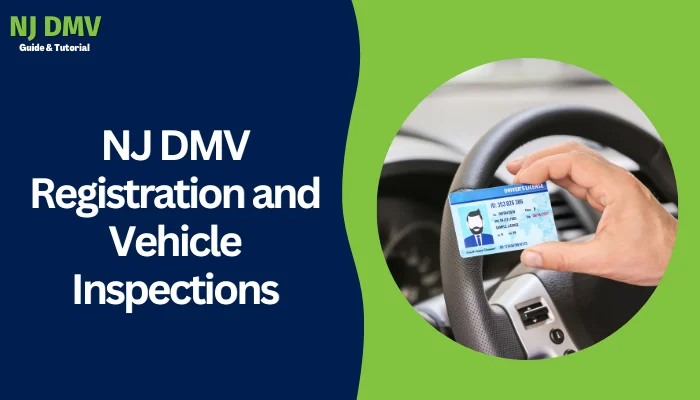Though challenging, navigating the NJ DMV registration process can be simplified using the right information.

This guide addresses everything that concerns NJ DMV registration, from initial registration to renewal and making appointments.
You will have a clear understanding of what to expect and how to ensure that your registration runs smoothly by the end of this guide.

NJ DMV Registration: Overview
It is important to understand the NJ DMV registration process when you own a car in New Jersey. With this registration your vehicle becomes legal and does allow for its driving on public roads.
The NJ DMV registration process entails numerous steps which include gathering necessary documents, knowing fees payable and filling forms among others. The major components are as follows:
- Required Documents: When doing registration, some documents such as proof of identity, ownership documents, insurance documents and payment for registering should be submitted.
- Registration Fees: Depending on whether it is commercial or non-commercial vehicles, weight considerations among other factors determine fee structures at time of renewal or purchase through NJ motor vehicles website for better rates always check out their website where they keep updated charges.
- Filling Out Forms: It is critical that all required forms are filled accurately so as not to interrupt the process of registering properly due incorrect or unfinished forms.
The successful navigation around registration ensures that your car has legal recognition hence avoiding charges and fines. Next we will explore first-time vehicle registration steps.
Steps To Register a Vehicle in New Jersey
Registering a vehicle for the first time in New Jersey comprises of well defined stages. This section shows you how you can go about NJ DMV registration systematically thus know exactly what awaits you there.
Step By Step Guide
- Gather Necessary Documents: Before visiting the DMV, ensure that you have all required documents which include proof of identity, vehicle ownership papers, insurance proof and any fee that may apply.
- Visit the DMV: Locate the nearest DMV office where you will deliver your documentation and forms physically. Beforehand it is recommended to check opening hours and if there are any COVID-19 rules specific to that place.
- Complete the Application: Accurately fill out a Vehicle Registration Application (Form BA-49). This form can be downloaded at the local DMV or online.
- Pay Registration Fees: Pay all fees that are as per your vehicle types and other factors such as whether it is a commercial or non-commercial vehicle. Cash, checks as well as credit/debit cards are accepted for payment.
- Receive Your Registration: Once everything is processed, you will get your registration card plus license plates having validation stickers.
Completing an initial registration sets up a base for lawful driving without stress in New Jersey. Next we will discuss how to renew your vehicles’ registration.
NJ DMV Registration Renewal
Registration of vehicles in New Jersey is not a one-off thing; it needs constant renewal of ones’ NJ DMV registration so that the car remains registered legally under law. In this part, we shall outline on how to go about its renewal including time frames involved and steps that are needed in order to do so.
Renewal Process
- Check Renewal Notice: A notice for renewal is sent by NJ DMV just before your registration expires with essential information on what should be done next during this process.
- Gather Required Information: While renewing your registration with the NJ DMV, you should have your current registration card, insurance proof, and a payment for renewal fees.
- Renew Online: The most convenient means of NJ DMV registration renewal is through online via their website i.e., (New Jersey Motor Vehicle Commission website). Make sure that you have with you your renewal notice and credit/debit card to pay.
- Renew by Mail or In-Person: Nonetheless, it is possible to undertake this process through mail or appear in person at any MVC office. When mailing in the form for renewal send it along with payment to the address provided on your renewal notice.
- Receive Renewal Confirmation: After processing of your renewal, you will obtain a new registration card as well as validation stickers.
It is vital that you are up to date with the NJ DMV Registration Renewal, so you don’t get fined and maintain the legitimacy of driving your car all year long. Next up: how to make an appointment at a DMV office for various registration services?

Making an NJ DMV Registration Appointment
Making an appointment can save time during one’s visit to register his or her vehicle at any New Jersey Motor Vehicle Commission location. This part will guide you on scheduling appointments.
Appointment Scheduling Process
- Visit the NJ MVC Website: Start by visiting the New Jersey Motor Vehicles Commissions’ website and navigate to NJ DMV registration appointment scheduling section.
- Select Service Type: Select what service category such as initial registration, renewing it or title transfer among others that require an NJ DMV registration appointment from a list.
- Choose a Location: Choose where is easier for you to go among several suitable options for registrating online in New Jersey – see available days and times.
- Provide Personal Information: Fill out your details like name, contact information and any relevant vehicle information you may have.
- Confirm Appointment: Go through the NJ DMV registration appointment details and confirm it. You will receive a confirmation email containing the appointment details.
An actual NJ DMV REGISTRATION APPOINTMENT could make your visit to the DMV shorter as well as help you gather all of your vital documents up front. Next, we’ll go into some common problems that one can experience with registration and how to avoid them.
Common Issues and How to Resolve Them
While registering a vehicle at NJ DMV is not difficult, sometimes some things go wrong along the way. This part has answers on how to solve major issues related to registration.
Common Issues and Solutions
- Incomplete Documents: One of the most frequent issues is appearing at dmv with incomplete documents. Please double check before going!
- Incorrect Forms: Make sure you complete all forms correctly; errors may lead to delays or refusal of application form submission. Before submitting, go through your forms thoroughly.
- Payment Issues: Ensure that you are carrying the correct amount for payment only using an acceptable mode of payment since different MVCs have varied payment options.
- Lost Registration Card: Sometimes in case you lose this card which identifies that your car or motorbike is legally registered in New Jersey; there is possibility for requesting duplicate by applying online or visiting MVC office near you – be ready with identification papers alongside full description of your car.
- Missed Renewal Deadline: If you miss your NJ DMV registration renewal deadline for NJ DMV registration, there might be penalties paid late after due date lapses – try renewing immediately so no extra fines come about.
Awareness about these difficulties should make doing a NJ DMV Registration smoother and more efficient on both ends, especially when updating information related to such registrations is concerned moving forward
Updating Your NJ DMV Registration Information
It is crucial to always keep your registration information up-to-date so you can avoid legal issues and get important notices. This part deals with how to update your registration details.
Updating Process
- Change of Address: If you move, it is necessary to notify the NJ DMV about it within seven days. This can be done online or at any DMV office.
- Change of Name: You will also have to change your registration if your name changes. Provide proof for that, like a marriage certificate or court order.
- Vehicle Modifications: Whenever you do some major modifications on your vehicle like changing its color or putting a different engine on it, the registration should reflect this as well.
- Selling Your Vehicle: Notify the NJ DMV once you sell your vehicle in order for them to update the registration records. Thus, this ensures that one’s not held liable for any future accidents involving the car.
- Lost or Stolen Plates: In case of lost number plates, report immediately to DMV and make request for replacements.
For legal compliance and avoiding potential problems, it is very important that you keep up with current registration data. Next we are going to discuss how vehicle inspections relate with registrations matters.

NJ DMV Registration and Vehicle Inspections
Your NJ DMV registration depends heavily on vehicle inspections done every time they are due. This section will show how these inspection requirements are linked to the process of registering vehicles.
Inspection Requirements
- Initial Inspection: New cars need an initial inspection before they are released into traffic in order to establish whether they meet safety together with emissions criteria.
- Regular Inspections: Vehicles must undergo regular inspections after their first checks every two years just so they can continue being compliant of safety and environmental standards.
- Inspection Stations: You will be able to have your vehicle inspected at any state certified inspection station. When you go for the inspection, remember to carry along with you both registration as well as insurance papers.
- Failed Inspections: If a vehicle fails the inspection, necessary repairs should be made before re-inspection. Failure of your vehicle passing an inspection may lead to NJ DMV registration renewal issues.
- Exemptions: Some specific historical vehicles like cars may not require regular inspections. These exemptions are stated in the NJ DMV site so check it out.
To keep your NJ DMV registration updated is very important since it helps avoid legal issues that might arise if things go wrong. Next we’ll look into how special vehicles are registered under this process.
Registering Special Vehicles
Certain types of vehicles require unique processes when registering them with NJ DMV registration department. This section highlights how motorcycles, trailers and commercial vehicles are registered.
Special Vehicle Registration
- Motorcycles: Motorcycle registration follows almost the same procedure as that of cars; however you need proof of ownership documentations, insurance documents and fee payments for your certificate of title from this body.
- Trailers: The NJ DMV must also register all trailers that are being used in New Jersey State; one should present weight, proof of ownership plus fees payment for your certificate of title from this body.
- Commercial Vehicles: Commercial vehicle drivers who use their personal cars or trucks not only have to provide proof they actually use their rides commercially but also comply with federal laws pertaining to such practices within this state’s code books or statutes which have been enacted by its legislature at these times so far over past years (12 U.S.C 1848). Ensure you’ve got all required paperwork ready for examination.
- Historic Vehicles: Historic vehicles may qualify for special registration plates. Provide proof of the vehicle’s age and condition to apply for historic plates.
- Farm Vehicles: The NJ DMV might have different registration requirements for farm vehicles, which are mainly used for agricultural practices.
When you understand the special vehicle registration requirements, all your cars will be in compliance with the law. Afterward, we will discuss the role of insurance in registration.
The Role of Insurance in NJ DMV Registration
Insurance is an important aspect of an individual’s registration. In this part we shall look at what insurance covers and how to ensure a vehicle is adequately covered.
Insurance Requirements
- Minimum Coverage: According to New Jersey law, drivers must carry a minimum amount of liability coverage that includes bodily injury and property damage.
- Proof of Insurance: When you register your car, you need to demonstrate proof of insurance. It could be either an insurance card or a declaration page from your policy.
- Continuous Coverage: You must maintain auto insurance on your vehicle at all times or risk fines and suspension of registration.
- Updating Insurance Information: If you get another insurer or make changes to your policy, then make sure that the NJ DMV has accurate information in order not to spoil your license renewal procedure.
- High-Risk Drivers: High-risk drivers may need more insurance or show evidence of financial responsibility.
Having proper insurance is vital as it pertains to fulfilling the requirements for NJ DMV registration. Following this we will talk about switching registrations when acquiring/selling a car(s).
Transferring NJ DMV Registration
It becomes necessary to transfer one’s NJ DMV registration when purchasing or selling a vehicle. This section explains how registration transfers are done.
Transfer Process
- Buying a Vehicle: When you buy a new car, its title must be transferred into your name after which there are other documents that you should submit such as a proof of insurance and the payment for transfer fees.
- Selling a Vehicle: When selling the car, one must complete the title transfer section and issue the buyer with a bill of sale. Inform NJ DMV about the sale to update its registration records.
- Inheriting a Vehicle: If you inherit a vehicle, you will have to register it in your name. Bring necessary papers together with an evidence of an inherited property like testament or court order.
- Gifted Vehicles: For gifted automobiles, there is need for submission of gift letter alongside other relevant paperwork that facilitates legal ownership changeover.
- Out-of-State Vehicles: Out-of-state vehicles which are brought into New Jersey must be registered within 60 days after moving in; this requires presenting out-of state title, providing proof of insurance, and paying applicable fees.
Knowing how to transfer will help you keep your registration updated while buying or selling cars. Following them now we will discuss why license plates are important during registration process.
Conclusion
Following this comprehensive guide can make your movement through the NJ DMV registration process smoother and more confident.
Eventually all motor vehicles become legally roadworthy machines not liable to any kind of fines, penalties whatsoever thus contributing to safer roads for all others involved on them than those who drive legally registered vehicles while keeping track on what’s going on with their registrations in accordance with New Jersey law.
Contents
- NJ DMV Registration: Overview
- Steps To Register a Vehicle in New Jersey
- NJ DMV Registration Renewal
- Making an NJ DMV Registration Appointment
- Common Issues and How to Resolve Them
- Updating Your NJ DMV Registration Information
- NJ DMV Registration and Vehicle Inspections
- Registering Special Vehicles
- The Role of Insurance in NJ DMV Registration
- Transferring NJ DMV Registration
- Conclusion
